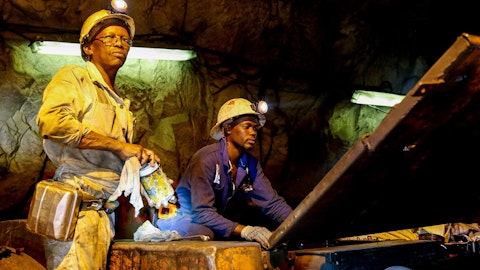Materion Corporation (NYSE:MTRN) Q4 2023 Earnings Call Transcript February 15, 2024
Materion Corporation beats earnings expectations. Reported EPS is $1.41, expectations were $1.38. MTRN isn’t one of the 30 most popular stocks among hedge funds at the end of the third quarter (see the details here).
Operator: Greetings, welcome to the Materion Fourth Quarter and Full Year 2023 Earnings Conference Call. At this time, all participants are on a listen-only mode. A question-and-answer session will follow the formal presentation. [Operator Instructions] Please note, this conference is being recorded. I will now turn the conference over to your host, Kyle Kelleher, Manager of Investor Relations. You may begin.
Kyle Kelleher: Good morning and thank you for joining us on our fourth quarter 2023 earnings conference call. This is Kyle Kelleher, Manager, Investor Relations. Before we begin our remarks this morning, I would like to point out that we have posted materials on the company’s website, that we will reference as part of today’s review of the quarterly results. You can also access the materials through the download feature on the earnings call webcast link. With me today is Jugal Vijayvargiya, President and Chief Executive Officer; and Shelly Chadwick, Vice President and Chief Financial Officer. Our format for today’s conference call is as follows. Jugal will provide opening comments on the quarter and full year, as well as an update on key strategic initiatives.
Following Jugal, Shelly will review the detailed financial results for the quarter and full year, in addition to discussing our expectations for 2024. We will then open up the call for questions. Let me remind investors that any forward-looking statements made in the presentation, including those in the outlook section and during the question-and-answer portion are based on current expectations. The company’s actual performance may materially differ from that contemplated by the forward-looking statements as a result of a variety of factors. Those factors are listed in the earnings press release, we issued this morning. Additionally, comments regarding earnings before interest, taxes, depreciation, depletion and amortization, net income and earnings per share, reflect the adjusted GAAP numbers shown in attachments 4 through 8 in this morning’s press release.
The adjustments are made in the prior-year period for comparative purposes and removed special items, non-cash charges and certain discrete income tax adjustments. And now, I’ll turn over the call over to Jugal for his comments.
Jugal Vijayvargiya: Thanks, Kyle, and welcome, everyone. It’s great to be with you today to talk about our fourth quarter performance and our record results for full-year 2023. I’m proud of our team’s focus and resilience, leading our company to another year of record sales and earnings. We overcame significant headwinds in some of our largest markets to deliver strong results, demonstrating the power of our balanced portfolio and the extraordinary potential of our unique customer partnerships. Our sharp focus on operational excellence led to continued meaningful margin expansion, structurally improving our profitability, and preparing us to maximize performance as markets recover. And while we managed our costs closely, adjusting to uncertain economic conditions, we continue to invest for the future, seeding the pipeline for long-term organic outgrowth.
In the fourth quarter, the diversity of our portfolio continued to be a highlight, while several of our markets remained challenged. When excluding semiconductor, our largest market, which is experiencing significant market weakness, our sales were up slightly. Our aerospace and defense sales grew nearly 70% year-over-year, representing the 11th consecutive quarter of growth for this market. In addition to the benefits from significant organic wins in space and defense, we also saw the impact of continued increase in our content per plane. On the other hand, our semiconductor and industrial end markets continued to show significant weakness in Q4. In semi, we saw our third consecutive quarter of meaningful year-on-year declines, but the order patterns are starting to show signs of stabilization.
We are also seeing some positive indicators in the broader market and expect that the related increase in demand will positively impact us starting in the second half. Our performance in the industrial space is impacted by its largest application related to non-residential and warehouse construction bills. With the impact of COVID on office space utilization, combined with higher interest rates, the demand for our beryllium nickel sprinkle material is seeing a significant inventory correction that will carry through the year. While our end market outlook remains mixed, we continue to make significant advancements on strategic initiatives that position us for long-term growth. Our organic growth projects, aligned with compelling global mega trends have allowed us to win exciting new business and ensure that we continue our strong track record of outgrowing our underlying end markets.
The emerging space market continues to be a source of new opportunities for us, as illustrated by a recent fourth order to supply critical materials for space propulsion systems. These four important orders, along with several other organic wins in this market, contributed approximately $90 million in new business orders during the year. We have positioned our company as a trusted partner supplying critical materials into this exciting high-growth market. Our technical expertise continues to lead to new R&D partnerships that will drive innovation and new opportunities in several of our key end markets. In November last year, we announced that we were awarded a $5 million contract with the United States Air Force for a project to develop additive manufacturing capabilities for beryllium materials.
Today, we are pleased to announce a new $4 million award from another government agency to fund additive manufacturing for other advanced materials across the aerospace, defense, and energy markets. These projects will enable us to better serve both new and existing customers who will require more complex components for next-generation applications. We are preparing for the recovery in the semi-market by expanding our capabilities. The proliferation of artificial intelligence for AI applications, specifically generative AI tools, will result in increased demand for hardware to power it. That will mean greater worldwide need for chips, which we directly support with our highly engineered semiconductor materials. Chips used to drive built-in AI capabilities in devices such as smartphones, tablets, and PCs will be in highest demand.
By providing materials for both physical vapor deposition and atomic layer deposition, two important methods for the manufacture of these high-power semiconductor chips, Materion is the vital part of the supply chain enabling on-device AI functionality. We are pleased to announce that we’ve recently launched two new atomic layer deposition materials for advanced memory meeting the needs of our customers, who are rapidly innovating to power these future applications. In addition, our tantalum materials are used to fabricate logic chips that power AI as well as high bandwidth memory chips employed in AI processing centers. We expect the market for those chips to significantly grow over the next five years and are making investments to ensure we are ready to support that demand.
Our semiconductor capabilities will also be critical to the continued evolution of the automotive industry as the shift toward electric and autonomous vehicles continues to advance. As a reminder, these vehicles require two to ten times more chips per vehicle. The transition and advanced mobility is supporting growth for our precision optics business, which is seeing an increase in demand for optical components. We are pleased to share that we’ve secured another customer contract to supply optical components for LIDAR technologies for autonomous vehicles. Our materials are in LIDAR modules at six vehicle OEMs currently, and we are actively providing prototypes to expand further. We have positioned ourselves as a critical technical partner in these exciting next generation products and are looking forward to additional opportunities to serve this emerging market.

We’re building a strong pipeline of opportunities to support the clean energy transition with the successful development of two clean energy opportunities last year. We have also continued our work with Kairos Power and will be supplying additional material in support of their molten salt nuclear reactor program. In addition, we successfully completed the facility upgrades required to support a customer funded $15 million investment to provide critical materials for power generation. Our shipments to the customer remain ahead of schedule. Our precision clad strip facility is now fully ramped and contributing meaningfully to our performance. We remain on track with our capacity expansion, which we expect to start production at the end of this year.
We have also secured a record $60 million in new defense orders in ’23 as we continue to strengthen relationships with our key partners. Our materials are critical to the performance of leading edge defense applications. The advancements I’ve outlined underscore the significance of our outgrowth initiatives that continue to create momentum and give us confidence as we move forward. As we share during the year, we have been focused on making targeted adjustments to improve our cost structure in order to improve the efficiency and performance of our business. This approach has been a key enabler as we expanded margins by 170 basis points last year, reaching 19.3% of sales nearing our midterm target of 20%. We’ll continue to focus on operational excellence as we head into 2024 to manage through market softness and maximize our performance as markets gradually recover in the second half of the year.
Our performance in ’23 strengthened the confidence we have in our strategy as we delivered another record year despite volatile market conditions. I’m very proud of our team’s hard work and relentless focus on delivering results and creating value for all of our stakeholders. The advances we made in ’23 are paving the way for another year of record results this year. Now, let me turn the call over to Shelly to cover more details on the financials.
Shelly Chadwick: Thanks, Jugal, and good morning, everyone. During my comments, I will reference the slides posted on our website this morning starting on slide 13. In the fourth quarter, value added sales, which exclude the impact of pass-through precious metal costs were $289.7 million down slightly from prior year, but up 7% sequentially. Despite strength in aerospace and defense, semiconductor and industrial remain challenged as Jubal outlined. When looking at the earnings per share, we delivered adjusted earnings of $1.41 in the fourth quarter down slightly from prior year. Moving to slide 14, adjusted EBITDA in the quarter was $53.3 million, or 18.4% of value added sales, down 4% from the prior year with margin expansion of 10 basis points.
This year-over-year decrease is mainly due to the volume decline, but strong price mix and operational performance, including the targeted cost improvement initiatives are contributing to the increase in margins. These results also include the year-to-date adjustment to the expected manufacturer’s production credit benefit, as we announced earlier this year. Moving to slide 15, let me now review fourth quarter performance by business segment. Starting with performance materials, value added sales were $186 million, up 5% compared to prior year, and up 10% sequentially. This record quarter and year-over-year increase was driven by strength across the aerospace and defense end markets, including meaningful contributions from space applications.
EBITDA excluding special items was $46 million, or 24.7% of value added sales, up 4% compared to $44.3 million in the fourth quarter of 2022. This growth was primarily due to higher volume, favorable price mix, and strong operational performance, despite the unfavorable year-to-date adjustment to the manufacturer’s production credit. Moving to the outlook, we expect aerospace and defense to remain strong in 2024, and we’ll remain on track with the expansion of our precision clad strip facility, which is expected to ramp in the latter part of 2024. Despite these growth drivers, we expect the industrial and automotive end markets to remain challenged while they face continued inventory corrections. Next, turning to electronic materials on slide 16.
Value added sales were $77.7 million, down 21% compared to the prior year, as a result of the significant weakness in the semiconductor market. EBITDA excluding special items was $11 million, or 14.2% of value added sales in the quarter. Despite the size of a volume decline, targeted cost improvement initiatives helped to mitigate the semiconductor market’s office. As we look forward to 2024, we expect semiconductor to remain challenged through the first half of the year, with a gradual recovery starting in the second half. As we saw a delay in the market downturn’s impact on material, we will experience a similar delay with the overall market upturn based on our position in the inventory chain. The first quarter of 2023 was among the strongest in the company’s history for semi, with the decline beginning in Q2.
And while we manage through the end of the downturn, we expect to see continued benefit from our operational excellence initiatives. Finally, turning to precision optics segment on slide 17. Value added sales were $26 million, down 6% compared to the prior year. This decrease was mainly driven by reduced PCR filter demand and general softening in the consumer electronics market, partially offset by strength in defense. EBITDA excluding special items was $3.8 million, or 14.7% of value added sales. The decrease in volume was a meaningful driver of this year-over-year decline, offset by positive price mix, and the benefit of targeted cost improvement initiatives. From a sequential standpoint, we saw another quarter of EBITDA growth, along with 170 basis points of margin expansion.
Looking out to 2024, we expect defense, space, and automotive to drive top line growth, and expect a continued benefit from the cost improvement initiatives implemented. Moving to slide 18, let me comment on the full year. We delivered our third consecutive year of record value added sales, adjusted EBITDA, and adjusted earnings per share. Value added sales reached an all-time high of $1.1 billion, about 1% from the prior year. This year-over-year increase was mainly attributed to strength in aerospace and defense, and precision clad strips offset by the significant semiconductor market weakness. Adjusted EBITDA for the year was $217.7 million, or 19.3% of value added sales, up 11% from the prior year, with margin expansion of 170 basis points.
The significant margin performance was largely driven by favorable price mix, strong operational performance, including the targeted cost improvement initiatives, and the benefit from the manufacturer’s production credit. We delivered $5.64 in adjusted earnings per share for the year, up 7% as compared to the prior year, despite a $0.40 interest expense headwind. 2023 did provide a favorable tax rate at 13.3%, from the impact of the non-taxable production credit, and an outsized benefit from foreign earnings. Moving out of cash, debt, and liquidity on slide 19, we ended the quarter with a net debt position of approximately $413 million, and approximately $180 million of available capacity on the company’s existing credit facility. Our leverage at 1.9 times remains slightly below the midpoint of our target range.
Lastly, let me transition to slide 20 and address the full-year outlook. While we expect some of our TN markets to remain challenged in the near term due to macroeconomic conditions, we expect another year of record results driven by our organic pipeline and close customer partnerships. These growth drivers, along with continued operational excellence and the impact of our targeted cost initiatives will help drive earnings growth in 2024. With this, we are guiding to the range of $6.10 to $6.50 adjusted earnings per share, a 12% increase from the midpoint versus the prior year. We expect Q1 to be comparable to last year, but we’ll see sequential improvement each quarter thereafter. In closing, despite some market headwinds, 2024 is shaping up to be another exciting year of market outgrowth and strong execution from Materion, leading to yet another year of record results.
This concludes our prepared remarks. We will now open the line for questions.
See also 20 States That Have America’s Strongest Unions and 12 Highest-Paid Women CEOs.
Q&A Session
Follow Materion Corp (NYSE:MTRN)
Follow Materion Corp (NYSE:MTRN)
Receive real-time insider trading and news alerts
Operator: Thank you. At this time, we’ll be conducting a question and answer session. [Operator Instructions] And the first question today is coming from Daniel Moore from CJS Securities. Daniel, your line is live.
Daniel Moore: Thank you. Good morning, Jugal. Morning, Shelly. Thanks for taking the questions.
Jugal Vijayvargiya: Hey, good morning Dan.
Daniel Moore: Good morning. Maybe start with the outlook and appreciate all the color. Just give us a sense for what level of value added sales growth is associated with your guide for ’24 and maybe just talk to the cadence a little bit, given a much tougher comp in Q1, as you described embedded within those assumptions?
Jugal Vijayvargiya: Yes, Dan, as you look at our deck that we provided, we did share some of the end market growth outlooks between the various markets that we serve. We see a couple of markets on the positive favorable side, I’d say more than a 3% type of a growth, particularly aerospace, defense, and then more of the space segment of aerospace with the new business wins that we’ve had, I would say low single digits on several of our markets and a couple of markets that we frankly see contracting. So when we look at our overall growth for year-over-year, I would say mid single digits, it’s probably reasonable for the full year. However, I would see that skewed to the back half of the year. I think the first half of the year, especially with our Q1 comps semi, as Shelly noted, was a very, very strong quarter for us last year in Q1, one of the strongest, I think, in the company’s history, as the semi slowdown had not caught up to us.
Whereas now, of course, we’re in the full semi slowdown mode and it’ll start to show the signs of recovery here in the second half of the year. So, I would expect just light growth in the first half of the year, but a much more robust growth in the back half of the year led by semi, but then also other markets as well, as well as new business activities, and so I could see a roughly a mid single digit overall for the year.
Shelly Chadwick: Yes. And as you heard in my comments first quarter is going to look a lot like first quarter last year. So when I think about the year from an earnings perspective, I’m expecting maybe a 45%, 55% waiting first half to second half.
Daniel Moore: Very helpful. It makes perfect sense. And then shifting gears a little bit longer term, I appreciate all the commentary on the semi side beyond the market growth, how should we think about the opportunity for content gains driven by higher powered logic chips, some of those which you described, Jugal in your prepared remarks looking out over the next three to five years and has that outlook changed at all?
Jugal Vijayvargiya: Right. Frankly, the outlook has not changed at all for us for a longer term. Semi is our largest market. It’s one that we’re very, very excited about. And we continue to be very excited about where things are headed in the next three to five years. We are continuing to invest in the semi space. For example we just mentioned that today that we’re launching two new ALD materials. These are atomic layer deposition materials that are going to be used for advanced memory and AI applications. We all are hearing what’s going on the AI front. And I think we’re really, really well prepared for both advanced memory as well as advanced logic with our tantalum portfolio, as well as the number of other materials that we have.
And in addition to that, I think when you look at overall semi investments on the capacity side, we’re putting the right investments in on the capacity side for the short-term update, but also be able to capture the long-term growth. So I think on the semi side we remain excited. I would say we should probably even more so than we were earlier because of the uptake that’s going to happen here in the near term, but then continued growth in the three to five years. Our portfolio is really well-positioned. Last comment, I think on the power side, as you know, power semiconductor is an important part of our portfolio. We see the applications for power semiconductor continuing to increase, whether it’s EV applications or other industrial applications and our positioning with the portfolio, the product portfolio that we have, but also I would say just equally as important the customer portfolio that we have on the power semi, it’s extremely, extremely strong.
So we are feeling very confident I think in our ability to grow both short term and long term for the semi market.
Daniel Moore: Perfect. Last one I’ll jump out is the guide implies, we’re closing in on that 20% EBITDA margin goal. Just wondering maybe if not necessarily providing an updated goal today, but talk about the operating leverage ability of the business beyond what you’ve already generated over the last two to three years? Thanks again.
Jugal Vijayvargiya: Yes. So let me just comment a little bit first of all on ’23, right? Two of the four quarters we delivered a 20% margins and I’ve said this a number of times that we’d like to go to see that on a more consistent basis. I feel that we’re positioning ourselves more and more to be able to deliver that on a consistent basis, and would not be surprised if ’24 represents a much more consistent basis for that 20% margin delivery. And then, clearly, that’s not the end for us. As you know, we continue to challenge ourselves more and more and we will be setting up an objective that I’m sure we’ll be talking to you at some point that defines what we think we can be in three to five years from now. And that’s something we’re looking forward to, and perhaps having that discussion during ’24.
Daniel Moore: Look forward to it. Thank you again.
Jugal Vijayvargiya: Thanks, Dan.
Operator: Thank you. The next question is coming from Mike Harrison from Seaport Research Partners. Mike, your line is live.


